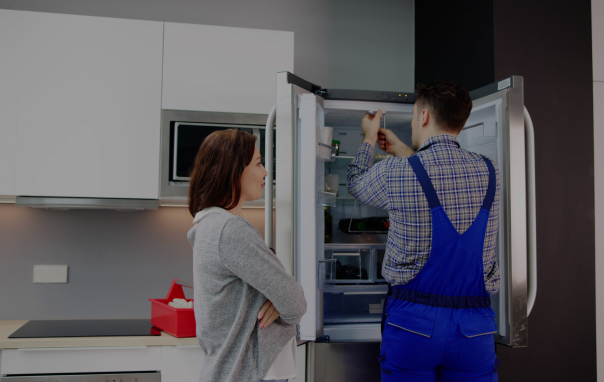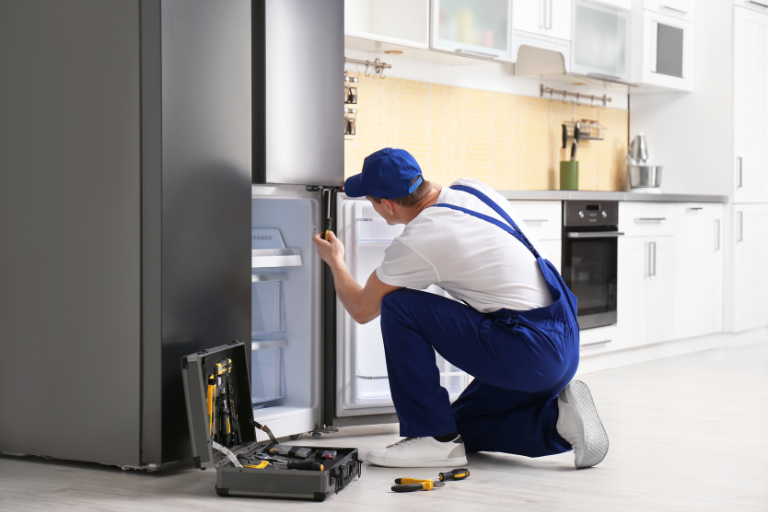How to Fix a Freezer That Not Freezing?

A freezer that isn’t freezing can be a major inconvenience, especially when it leads to spoiled food. Fortunately, many common freezer issues can be diagnosed and resolved with a few troubleshooting steps. This guide walks you through potential causes for a freezer that’s not freezing properly and offers solutions you can apply yourself or with the help of a professional. By understanding these common freezer problems, you can save time and money while ensuring your appliance operates efficiently.

Identify Common Reasons for Freezer Malfunction
When your freezer is not freezing properly, there are several potential causes. The most common issues include defrost problems, poor airflow, condenser fan problems, and temperature settings. By carefully inspecting these components, you can pinpoint the problem and take the necessary steps to fix it. Here’s a breakdown of each issue and how to address it.
Check for Overstuffing
Prevent Airflow Blockages
One common issue that can cause freezing problems is overstuffing your freezer. When the freezer is too full, airflow becomes restricted, preventing the cold air from circulating properly. This reduces the efficiency of the freezer and may cause food to remain at the wrong temperature. To resolve this, reorganize the contents of your freezer to ensure there’s enough space for proper circulation. Avoid packing the freezer too tightly, and be mindful of how items are placed inside to allow air to flow freely.
Inspect for Frost Buildup
Look for Ice Accumulation
Excessive frost buildup inside the freezer compartment can block airflow, leading to inefficient cooling. If frost is building up around the evaporator coils or other areas, the defrost system may not be functioning correctly. To resolve this, manually defrost the freezer by turning it off and allowing the ice to melt. If the issue persists, you may need to inspect the defrost heater or defrost thermostat for faults.
Clean the Dirty Condenser Coils
Remove Debris for Better Efficiency
Dirty condenser coils are one of the most common causes of cooling issues in freezers. When dust, pet hair, or dirt accumulates on the coils, it prevents the appliance from expelling heat efficiently, leading to temperature problems. To clean the coils, use a coil brush or vacuum to remove any dirt and debris. Regular cleaning of the condenser coils is essential for maintaining your freezer’s cooling performance.
Examine the Defective Fan Motors
Inspect the Condenser and Evaporator Fans
Both the condenser fan motor and evaporator fan motor play critical roles in circulating air through the freezer. If either of these fans is not functioning properly, cold air will not be distributed evenly, causing cooling issues. Check the fan blades for obstructions and test the motor for continuity. If the fan motor is faulty, you may need to replace it to restore proper cooling.
Assess the Broken Compressor
Diagnosing Compressor Issues
The compressor is the heart of your freezer’s cooling system. If the compressor is not functioning properly, it can prevent the freezer from reaching the desired temperature. Common signs of a broken compressor include warm temperatures in the freezer or strange noises coming from the appliance. Diagnosing and replacing a broken compressor is a complex task that typically requires a professional appliance technician. If you suspect that your compressor is malfunctioning, contact an experienced technician to perform the necessary repairs.
Evaluate Faulty Electronic Controls
Check the Control Board and Sensors
Modern freezers are equipped with electronic controls that regulate the temperature and other functions. A faulty temperature control board or sensor can cause the freezer to malfunction. If you notice irregular cooling or the temperature settings are unresponsive, inspect the electronic control components for faults. If the board or sensor is defective, replacing it may restore proper function.
Check for Worn-out Door Seals
Inspect the Door Gasket
Worn-out door seals or gaskets are another common cause of cooling issues. If the door seal is cracked or damaged, cold air can escape, and warm air can enter, preventing the freezer from cooling properly. Inspect the gaskets for signs of wear, and replace them if necessary. To check if the door seal is intact, close the door on a piece of paper and try to pull it out. If the paper slides out easily, the seal may need replacement.
Troubleshoot Temperature Settings
Verify Proper Temperature Control
Sometimes, the issue may be as simple as incorrect temperature settings. The optimal temperature for most freezers is 0°F (-18°C). Check the temperature dial or digital display to ensure that the freezer is set to the right temperature. If the settings are correct and the freezer is still not cooling, you may need to inspect the thermostat or other control components.
Verify Power Supply Issues
Check Power Connections and Breakers
If your freezer isn’t cooling and none of the previous solutions seem to work, it could be a power issue. Power supply problems or tripped circuit breakers can prevent your freezer from running correctly. Check the power cord, outlet, and circuit breaker to ensure that the freezer is receiving proper power. If there are no visible issues with the power supply, the compressor or control board might be the problem.
Inspect the Thermostat for Malfunctions
Test the Thermostat
The thermostat controls the temperature of the freezer. If the thermostat is malfunctioning, the freezer may fail to cool properly. Use a multimeter to check the thermostat for continuity, or refer to the manufacturer’s manual for testing instructions. If the thermostat is faulty, replacing it may solve the problem.
Clean the Freezer Interior
Clear Out Food Debris
Food particles, spills, and other debris can accumulate inside the freezer, obstructing air vents and reducing efficiency. Regularly cleaning the interior of your freezer is crucial for maintaining optimal airflow and cooling performance. Remove all items, clean the freezer walls and drawers, and wipe away any debris that may be obstructing vents.
Listen for Unusual Noises
Diagnose Strange Noises
If your freezer is making strange noises, such as buzzing, clicking, or humming, this could be an indicator of a problem. Loud or unusual sounds often suggest issues with the condenser fan motor, compressor, or evaporator fan motor. Listen closely to identify the source of the noise, and if necessary, schedule a repair service to address the issue.
Examine the Drainage System for Blockages
Clear the Drainage System
A blocked drain hole or drain tube can cause water to pool inside the freezer and lead to cooling problems. Inspect the drainage system for clogs caused by food particles, ice buildup, or debris. Use warm water or a pipe cleaner to clear the drain. Maintaining a clean drainage system is important for avoiding water leaks and ensuring proper temperature regulation.
Seek Professional Help if Needed
Contact a Professional Technician
If you’ve gone through the troubleshooting steps and your freezer is still not cooling, it may be time to call in a professional appliance repair technician. Freezers are complex appliances, and problems like refrigerant leaks, compressor issues, and electrical malfunctions often require specialized expertise. At Toronto Refrigeration, our team of skilled technicians can quickly diagnose and repair all types of freezer problems.
Regular Maintenance Practices
Keep Your Freezer Running Efficiently
Preventing freezer issues is easier than fixing them. Regular maintenance can help extend the life of your appliance and keep it running efficiently. Cleaning the condenser coils, checking the door seals, and ensuring proper airflow are essential tasks that should be done regularly. Additionally, consider scheduling routine inspections with a professional technician to catch potential problems before they become serious.

Why Choose Toronto Refrigeration for Your Freezer Repairs?
At Toronto Refrigeration, we offer reliable freezer repair services to help restore your appliance’s cooling efficiency. Our skilled technicians are equipped with the expertise to diagnose and fix a wide range of freezer issues, from compressor failures to frost buildup. We provide same-day service and affordable prices, ensuring that your freezer is back to working order as soon as possible. Our commitment to excellent customer service and satisfied clients makes us the top choice for appliance repairs in Toronto.
Conclusion
A freezer that’s not cooling can be a frustrating problem, but with the right troubleshooting steps, you can often identify and resolve the issue on your own. By checking common causes like dirty condenser coils, fan issues, and faulty thermostats, you can restore your freezer to optimal performance. If the problem persists, don’t hesitate to call a professional technician for expert help. At Toronto Refrigeration, we provide top-notch fridge repair service and efficient repairs to get your freezer working again. Keep your freezer running smoothly with regular maintenance and professional care from our team of experts.